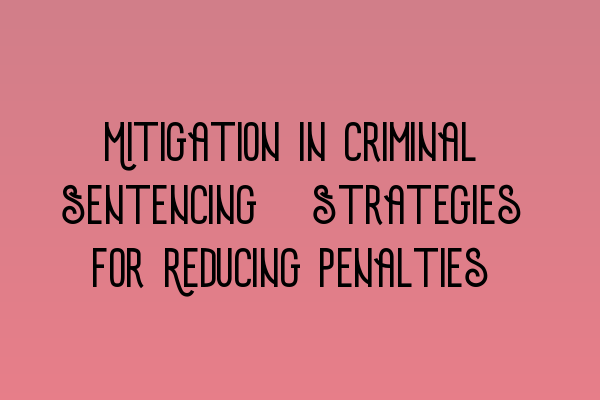Mitigation in Criminal Sentencing: Strategies for Reducing Penalties
When facing criminal charges, one of the key aspects to consider is mitigation. Mitigation is the process of advocating and presenting evidence to the court in order to reduce the severity of a sentence. It is a vital aspect of criminal law practice and can significantly impact the outcome of a case.
Understanding Mitigation
In criminal sentencing, mitigation aims to provide the court with compelling reasons to consider a lesser penalty. It involves presenting evidence that highlights the defendant’s mitigating factors, such as personal circumstances, remorse, cooperation with authorities, or any relevant background information that may impact the court’s decision.
Effective mitigation requires careful strategizing and preparation. It is crucial to gather evidence, interview witnesses, and consult with experts to build a strong case that supports the defendant’s mitigating factors. By doing so, it allows the court to make a fair and informed decision when determining the appropriate penalty.
Mitigation Strategies
There are several strategies that can be employed to effectively mitigate criminal sentences:
- Evidence of Good Character: Demonstrating the defendant’s positive character traits, community involvement, and past good behavior can help convince the court to show leniency.
- Remorse and Rehabilitation: Showing genuine remorse for the offense committed and highlighting efforts towards rehabilitation can also sway the court towards a milder penalty.
- Cooperation with Authorities: Providing evidence of cooperation with law enforcement agencies, such as providing information or assisting in the investigation, can be a powerful factor in mitigating the sentence.
- Restitution and Compensation: Offering to make restitution or compensate the victims can demonstrate a sincere effort to make amends, potentially leading to a lighter punishment.
- Medical or Psychological Conditions: Providing evidence of any medical or psychological conditions that may have contributed to the offense can help the court understand the underlying factors and consider alternative sentencing options.
Working with a Skilled Solicitor
Given the complexity and importance of mitigation in criminal sentencing, it is essential to work with a skilled solicitor who specializes in criminal law. A knowledgeable solicitor will have experience crafting persuasive mitigation strategies tailored to the specific circumstances of your case.
At SQE Criminal Law & Practice Law UK, we have a team of experienced solicitors who understand the nuances of mitigation and can guide you through the process. Our solicitors have a deep understanding of the UK legal system and are well-versed in the relevant legislation and case law.
If you require professional support in your criminal case, our solicitors can provide the expert guidance needed to present strong mitigation arguments. They will work closely with you to gather essential evidence, interview witnesses, and build a solid case that maximizes your chances of receiving a favorable outcome.
If you are interested in furthering your legal knowledge, we also offer a range of SQE 1 Preparation Courses and SQE 2 Preparation Courses. These courses are designed to equip aspiring solicitors with the necessary skills and knowledge to excel in their legal careers.
Conclusion
Mitigation is a crucial element in criminal sentencing. By employing effective mitigation strategies and working with an experienced solicitor, individuals facing criminal charges can improve their chances of receiving a reduced penalty. Remember, every case is unique, and having the right legal support can make a significant difference.
If you have any questions about mitigation or require legal assistance, contact SQE Criminal Law & Practice Law UK today.
Related Articles:
- SQE 1 Practice Exam Questions
- SQE 1 Practice Mocks FLK1 FLK2
- SQE 2 Preparation Courses
- SQE 1 Preparation Courses
- SRA SQE Exam Dates
